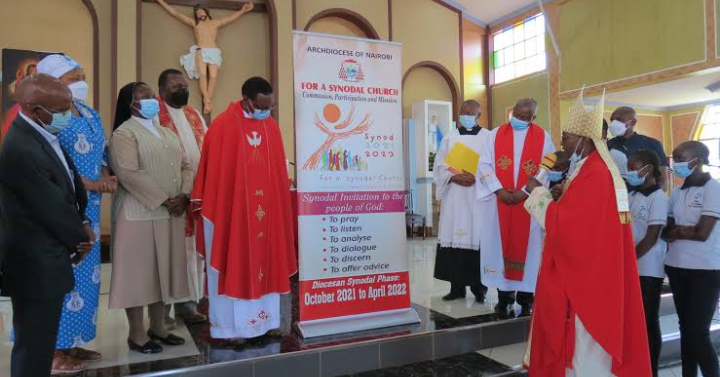The Archdiocese of Nairobi recently made a move in response to guidelines issued by the Kenya Conference of Catholic Bishops (KCCB), which discourage political figures from making donations to churches or using religious events as platforms for political promotion.
This directive aligns with the KCCB’s long-standing position that the church must remain neutral in political affairs, ensuring that its activities are not influenced or tainted by political agendas.
As part of its commitment to these principles, the Archdiocese has decided to refund several notable donations from prominent political figures.
Among the donations being returned are Ksh 200,000 contributed by Nairobi Governor Johnson Sakaja to the church’s choir, Ksh 600,000 from President William Ruto, which was intended for both the choir and the Parish Missionary Council (PMC), and a substantial Ksh 2 million from President Ruto for the construction of the Fathers’ house.
These refunds highlight the Archdiocese’s firm stance in adhering to the KCCB’s directive, reaffirming its dedication to maintaining the neutrality and integrity of church activities.
This decision is set against the backdrop of growing concerns about the blending of politics and religion in Kenya.
In recent years, the intersection of the two spheres has become a topic of increasing concern, as political figures frequently make donations to religious institutions, often as a means to garner political favor or to be seen as supporters of faith-based initiatives.
Such acts, while sometimes perceived as acts of goodwill, have raised questions about the potential for political influence over religious institutions, threatening the sanctity and impartiality of the church.
The KCCB has long championed the idea that churches should not become involved in political matters, stressing that religious gatherings should be spaces free from political interference.
The directive aims to safeguard the church’s credibility and ensure that it remains a place of worship and spiritual guidance, rather than a forum for political manipulation.
By returning these donations, the Archdiocese of Nairobi is signaling its intent to uphold this directive and avoid any perception that it is being used as a political tool.
However, the decision to return donations from high-profile political figures such as President William Ruto and Governor Sakaja has sparked debate within Kenyan political circles.
Donations to religious institutions have long been a common practice, with politicians using these contributions to build relationships with the electorate and gain visibility in the eyes of religious communities.
In many cases, these donations are viewed as a gesture of goodwill, designed to create a positive image of the politician while simultaneously supporting religious causes.
Despite the debate, the Archdiocese of Nairobi’s actions reflect a growing awareness of the need to keep the church free from political influence.
The church’s decision to return such big financial contributions from top politicians highlights its commitment to avoiding the perception that political figures are using the church to advance their own interests or gain favor among their constituents.
While this decision may have financial implications for the church, it demonstrates the Archdiocese’s prioritization of its spiritual mission over political alliances or financial gain.
This situation also serves as a reminder of the delicate balance that must be maintained between religious institutions and political figures in Kenya.
While politicians may view donations to churches as a way to cultivate goodwill, religious leaders are increasingly recognizing the importance of maintaining their institutions’ neutrality.
The Archdiocese of Nairobi’s stance, in alignment with the KCCB’s guidelines, sets an important precedent for how churches can preserve their independence and ensure that their role in society remains one of moral guidance rather than political favoritism.
The Archdiocese’s decision to refund these donations represents a crucial step in ensuring that the church remains a beacon of neutrality and impartiality.
By adhering to the KCCB’s directives, the Archdiocese not only upholds its commitment to the sanctity of religious practices but also reinforces the idea that the church must be a place of refuge and spiritual guidance, free from the influence of partisan politics.





















Add Comment